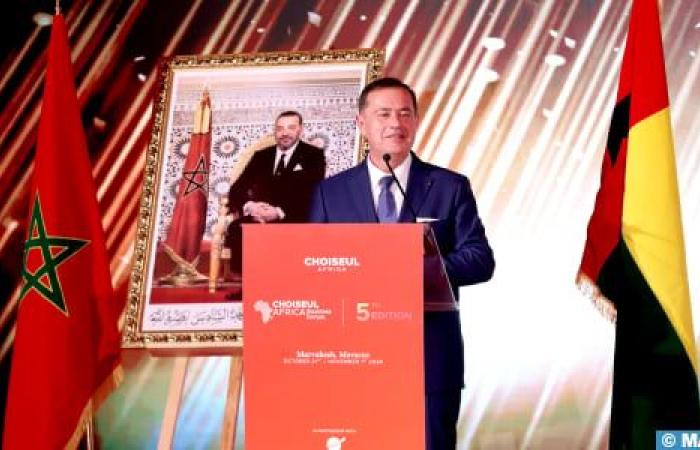Saturday, November 2, 2024 at 12:14
Marrakech – Morocco has become a key player in the development of investments in Africa, said the president of Choiseul Africa, Pascal Lorot, highlighting the Kingdom’s major contribution to the economic emergence of the Continent.
In an interview given to MAP on the occasion of the 5th edition of the Choiseul Africa Business Forum, organized under the high patronage of His Majesty King Mohammed VI, under the theme “Co-building winning and sustainable strategies: driving role of private sector and cooperation with the public sector”, Mr. Lorot noted that the Kingdom, through its banking, insurance or industrial companies, has a strong presence in Africa, thus constituting one of the major contributors to the strengthening of economic growth on a continental scale.
He also stressed that Morocco positions itself as an investment platform between sub-Saharan Africa and Europe, offering a business climate conducive to investment.
In this regard, he cited the Tangier Med port, with a multitude of European and North American companies investing there, thanks in particular to a quality and efficient workforce.
He also highlighted the policy of cooperation led by Morocco with other countries on the continent, particularly in sub-Saharan Africa, under the leadership of His Majesty King Mohammed VI.
Referring to “Choiseul Africa”, he explained that it is an initiative launched almost 10 years ago, to promote “the idea according to which Africa is a continent of becoming, a continent where everything is possible and a continent which will be one of the most structuring geographies on a global scale within a few decades”.
“We launched the Choiseul 100 Africa, which is a unique ranking of the continent’s 100 young talents among the youngest in their under-40 generations. This ranking has created a unique community over time which has grown over time and which today counts 900 winners across the continent,” he said.
As for the particularity of this 5th edition, he affirmed that it focused on the means capable of promoting better interaction between the public and private sectors, “since the private sector needs the public to develop. , while the public must also support the private sector”.
It is a question of “looking at the right tools, methods and mechanisms which will allow both to evolve in parallel, with the objective of accelerating growth, consolidating achievements and promoting education so that the labor supply corresponds to the needs expressed by companies”.
In addition to the partnership between the public and private sectors, this edition addressed various themes covered during panels on energy sovereignty, sovereignty in the field of agri-food, human capital, logistics, health, resilience, as well as questions related to culture and cultural good “since it is an industry in the making”.
“Africa, beyond its natural resources, has real capital, namely the wealth of its young men and women who are for the most part in the process of training and who deserve the right training to be in interface with the needs of the economy,” he observed.






